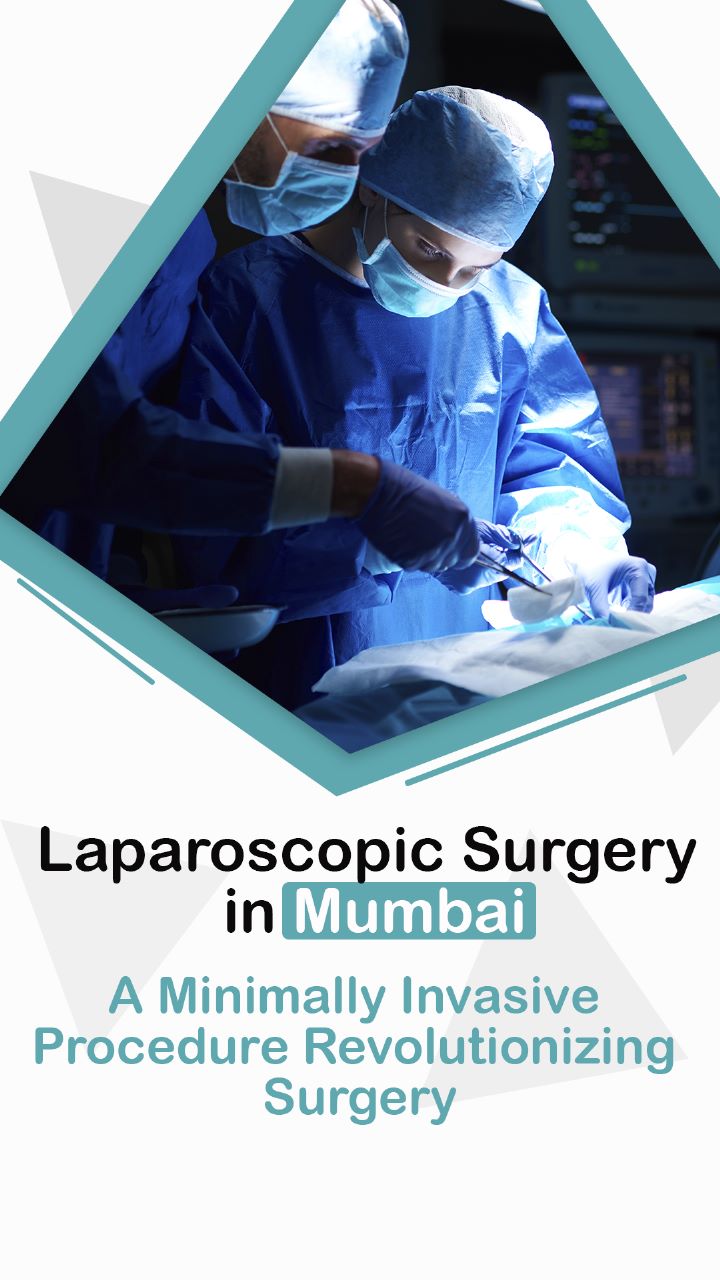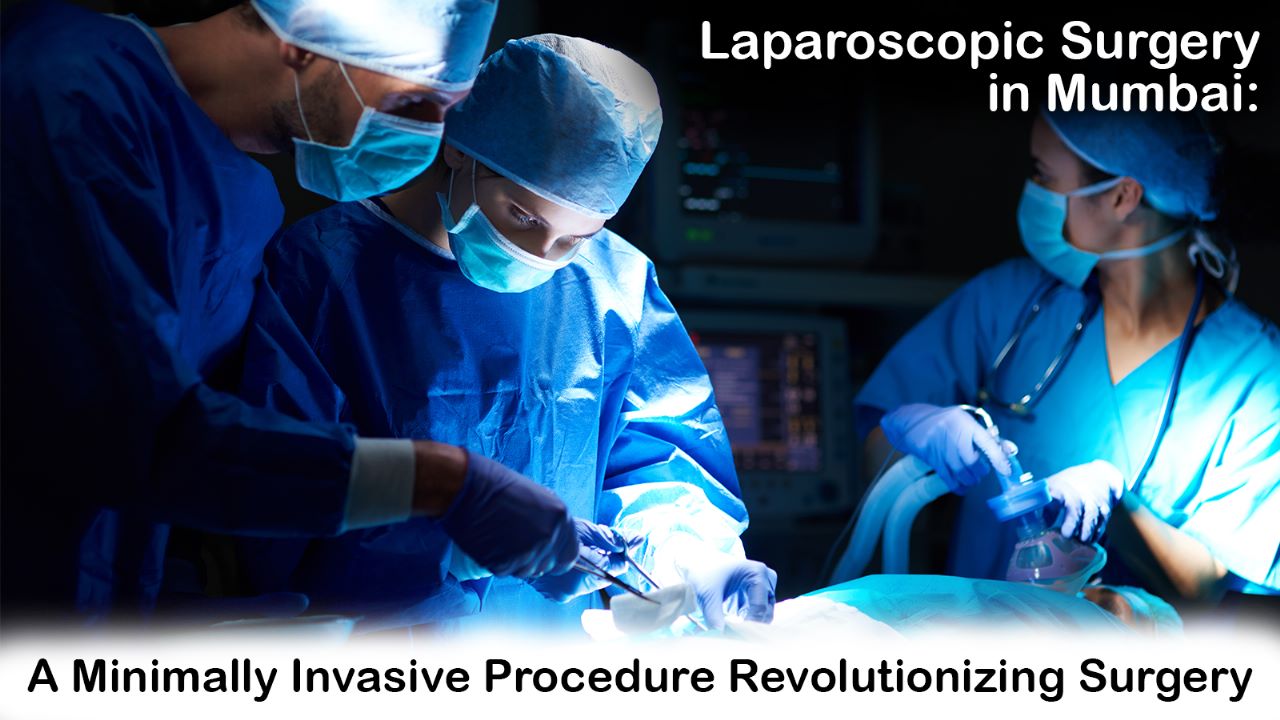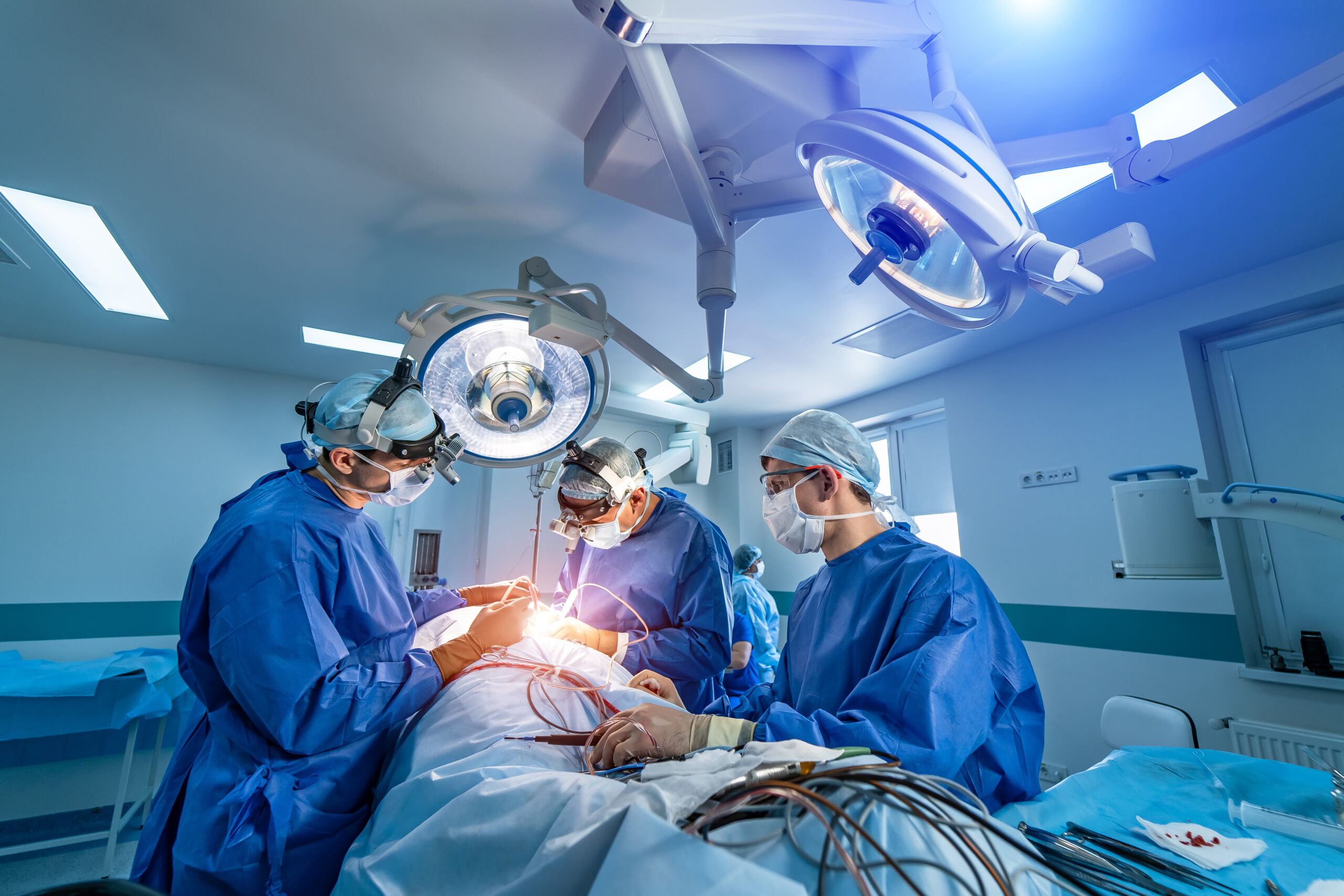

Laparoscopic Surgery in Mumbai : A Minimally Invasive Procedure Revolutionizing Surgery

Laparoscopic surgery in Mumbai , also known as keyhole surgery or minimally invasive surgery, is a surgical technique that has revolutionized the way surgeries are performed. laparoscopic surgery meaning “ The procedure uses a specialized instrument called a laparoscope “ , which is a long, thin tube equipped with a high-resolution camera and a light source, to visualize and operate on internal organs through small incisions in the body. This method of surgery has several advantages over traditional open surgery, including shorter hospital stays, reduced pain and scarring, and faster recovery times.
The Procedure
Laparoscopic surgery is performed under general anesthesia, and the patient is positioned on an operating table. The surgeon makes small incisions in the patient’s skin, through which they insert the laparoscope and other specialized instruments. The laparoscope transmits high-quality images of the internal organs to a monitor, allowing the surgeon to see inside the body and perform the surgery. After the surgery is complete, the instruments are removed, and the incisions are closed with sutures or surgical glue.
Advantages of Laparoscopic Surgery in Mumbai
One of the most significant advantages of laparoscopic surgery is the smaller incisions. Traditional open surgery requires a large incision that can be several inches long, which can result in significant scarring and a longer recovery time. In contrast, laparoscopic surgery in Mumbai requires only a few small incisions, typically less than an inch in length, which results in minimal scarring and a faster recovery time.
Another advantage of laparoscopic surgery is reduced pain and discomfort. Traditional open surgery can cause significant pain, which can require strong pain medication and a longer hospital stay. Laparoscopic surgery is typically associated with less pain and discomfort, which can result in a faster return to normal activities.
Additionally, laparoscopic surgery is associated with a lower risk of complications than traditional open surgery. The smaller incisions used in laparoscopic surgery reduce the risk of infection, and the reduced trauma to the body can result in a lower risk of bleeding and other complications.

Laparoscopic surgery scars
Laparoscopic surgery scars are typically smaller and less noticeable than scars from traditional open surgery. Because laparoscopic surgery only requires small incisions, the resulting scars are usually less than an inch in length and may fade over time. Additionally, some patients may be candidates for single-incision laparoscopic surgery, which can result in an even smaller and less noticeable scar.
Recovery and Follow-up Care
Recovery after laparoscopic surgery is typically faster than recovery after traditional open surgery. Most patients can return to normal activities within a few days or weeks, depending on the type of surgery performed. Patients may experience some pain and discomfort after surgery, but this can typically be managed with over-the-counter pain medications.
Follow-up care after laparoscopic surgery is similar to traditional open surgery. Patients may need to visit their doctor for follow-up appointments to monitor their recovery and ensure that there are no complications. Patients may also need to make lifestyle changes to support their recovery, such as avoiding strenuous activities or lifting heavy objects for a period after surgery.

Laparoscopic surgery cost in Mumbai
The cost of laparoscopic surgery in Mumbai can vary depending on several factors, including the specific procedure, the location of the Laparoscopic hospital in Mumbai or clinic, and the patient’s insurance coverage. However, in general, laparoscopic surgery in Mumbai tends to be less expensive than traditional open surgery due to the shorter hospital stays and reduced recovery times. Patients should consult with their Laparoscopic Specialist Surgeon in Mumbai and insurance company to determine the cost of their specific procedure.
Laparoscopic Surgery Vs Open Surgery – Check Benefits of Laparoscopic Surgery in Mumbai
| Benefits | Laparoscopic Surgery | Open Surgery |
|---|---|---|
| Incision size | Smaller incisions | Larger incisions |
| Pain and discomfort | Less pain and discomfort | More pain and discomfort |
| Recovery time | Shorter recovery time | Longer recovery time |
| Scarring | Minimal scarring | More scarring |
| Hospital stay | Shorter hospital stay | Longer hospital stay |
| Complications | Lower risk of complications | Higher risk of complications |
| Infection | Lower risk of infection | Higher risk of infection |
| Bleeding | Less bleeding | More bleeding |
| Need for blood transfusions | Less need for blood transfusions | More need for blood transfusions |
Types of Laparoscopic Surgery in Mumbai

Appendix laparoscopic surgery: This minimally invasive procedure removes the appendix through small incisions in the abdomen, typically due to inflammation or infection.
Laparoscopic hernia surgery: This procedure repairs a hernia through small incisions using a laparoscope and specialized instruments, with a shorter recovery time compared to traditional open surgery.
Ovarian cyst laparoscopic surgery: This procedure removes cysts from the ovaries through small incisions, with a faster recovery time and less scarring compared to traditional open surgery.
Laparoscopic gallbladder surgery: This procedure removes the gallbladder through small incisions, often due to the presence of gallstones or other issues.
Laparoscopic surgery for uterus removal: Also known as laparoscopic hysterectomy, this procedure removes the uterus through small incisions, typically due to conditions such as uterine fibroids or endometriosis.
Gallbladder stone laparoscopic surgery: This procedure removes gallstones from the gallbladder through small incisions, with a faster recovery time and less scarring compared to traditional open surgery.
Gallstones laparoscopic surgery: This procedure removes the gallbladder due to the presence of gallstones, typically through small incisions using a laparoscope and specialized instruments.

Laparoscopic hysterectomy surgery: This procedure removes the uterus through small incisions, with a faster recovery time and less scarring compared to traditional open surgery.
Single incision laparoscopic surgery: This advanced technique uses a single incision to perform laparoscopic surgery, resulting in even less scarring and faster recovery times.
Laparoscopic weight loss surgery: This procedure, also known as bariatric surgery, helps patients lose weight and improve their overall health through minimally invasive techniques.
Laparoscopic umbilical hernia surgery: This procedure repairs an umbilical hernia through small incisions using a laparoscope and specialized instruments, with a shorter recovery time compared to traditional open surgery.
Laparoscopic ovarian cyst removal: This procedure removes ovarian cysts through small incisions using a laparoscope and specialized instruments, with a faster recovery time and less scarring compared to traditional open surgery.
If you are searching for a Laparoscopic specialist doctor in Chembur, Santacruz, Sion, Mumbai or any nearby location in Mumbai then look no further than the most experienced and renowned Laparoscopic specialist surgeon in Mumbai Dr. Gatuam Nadkarni.
Frequently asked Questions and Answers
Laparoscopic surgery, also known as minimally invasive surgery or keyhole surgery, is a surgical technique that uses a specialized instrument called a laparoscope to visualize and operate on internal organs through small incisions in the body. This technique has many advantages over traditional open surgery, including less pain and scarring, faster recovery times, and a lower risk of complications.
Laparoscopic surgery is done for many reasons, including the diagnosis and treatment of various medical conditions. It is a minimally invasive surgical technique that allows for smaller incisions, reduced blood loss, and faster recovery time than traditional open surgery.
Laparoscopic surgery may be recommended for people who require surgical treatment for a wide range of conditions, including hernias, gallbladder disease, ovarian cysts, and many others.
Most patients experience less pain after laparoscopic surgery than after traditional open surgery. Pain levels can vary depending on the type of surgery and individual pain tolerance.
Laparoscopic surgery is performed using a small camera and specialized surgical instruments inserted through small incisions in the abdomen.
In many cases, laparoscopic surgery can be performed as a day surgery procedure, meaning patients are able to go home the same day as their surgery.
Open surgery involves making a large incision, while laparoscopic surgery involves making small incisions and using a camera to guide the surgical instruments. Laparoscopic surgery typically results in less pain and a faster recovery time than open surgery.
Laparoscopic surgery is a major surgery, but it is minimally invasive and has a shorter recovery time than traditional open surgery.
The number of incisions made during laparoscopic surgery can vary depending on the type of surgery, but typically, there are three to five small incisions.
Laparoscopic surgery can be used to perform a wide range of surgical procedures, including gallbladder removal, hernia repair, and ovarian cyst removal, among others.
The duration of laparoscopic surgery varies depending on the type and complexity of the procedure, but typically lasts between 30 minutes to several hours.
Recovery from laparoscopic surgery varies depending on the type and complexity of the procedure, but typically lasts between one to two weeks.
Walking after laparoscopic surgery is encouraged to prevent blood clots and to aid in the healing process. However, you should follow your doctor’s instructions regarding activity after surgery.
Like any surgery, laparoscopy has risks associated with it, such as bleeding, infection, and anesthesia complications. However, it is generally considered a safe and effective surgical technique.
Like any surgical procedure, laparoscopy is not always 100% successful. Success rates vary depending on the type of surgery and individual patient factors.
Common side effects of laparoscopy include pain, swelling, bruising, and mild bleeding. In rare cases, there can be complications such as bleeding, infection, or damage to surrounding organs.
The two main types of laparoscopy are diagnostic laparoscopy, which is used to diagnose conditions, and operative laparoscopy, which is used to perform surgical procedures.
Laparoscopic surgery may be recommended for people who require surgical treatment for a wide range of conditions, including hernias, gallbladder disease, ovarian cysts, and many others.
In many cases, laparoscopic surgery can be performed as a day surgery procedure, meaning patients are able to go home the same day as their surgery. However, some procedures may require an overnight hospital stay.
Laparoscopic surgery is generally considered a better option than open surgery because it is minimally invasive and has a shorter recovery time. However, there are some cases where open surgery may be necessary depending on the patient’s individual medical needs.
There are many skilled and experienced laparoscopic surgeons in Mumbai. It’s important to do your research and choose a surgeon who is board-certified and has a proven track record of successful surgeries. Dr. Gautam Nadkarni is one of the Most Experienced laparoscopic surgeon in Mumbai.

